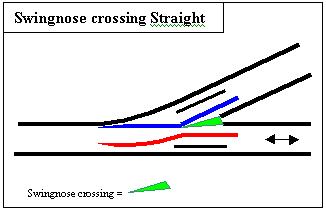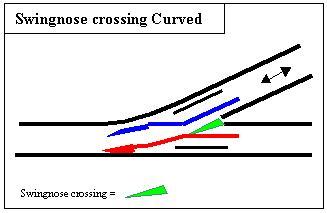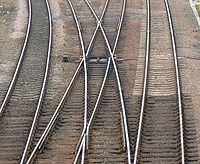
Swingnose crossing
Encyclopedia

Railroad switch
A railroad switch, turnout or [set of] points is a mechanical installation enabling railway trains to be guided from one track to another at a railway junction....
to eliminate the gap at the common crossing (a.k.a. frog) which can cause damage and noise.
Fixed crossing
On a fixed railway crossing, the wheels need only drift by a small angle, say 1 in 20, before the vehicle may start to go in the wrong direction at the V of a V-crossing. This problem can limit the maximum speed of vehicles using the crossing.In addition, the open gap at a fixed V-crossing forms a weak point on the railway line where the heavily-loaded wheel must bump across the resulting gap of about 10 cm, supported only by the portion of the wheel tread which is on the wing rail. This pounds the rail so much that the steel can deform and/or wear away. This damage may easily spread to other components including the wheels, and the noise can be a nuisance. Scheduling repair of damage can also be a problem in high traffic locations.
Swingnose crossing


The Swingnose crossing overcomes the problem of the gap by moving the point of the V-crossing from side to side, synchronised with the selected direction of the turnout. The wheels are supported the entire way on their treads, and do not produce noise and vibration that would otherwise occur.
Swingnose crossings are also useful where heavy rail and light rail
Light rail
Light rail or light rail transit is a form of urban rail public transportation that generally has a lower capacity and lower speed than heavy rail and metro systems, but higher capacity and higher speed than traditional street-running tram systems...
vehicles, which have different wheel profiles, share the same track.
Parameters
Swingnose crossings would be used for V-crossings finer than about 1 in 20, and for axle loadAxle load
The axle load of a wheeled vehicle is the total weight felt by the roadway for all wheels connected to a given axle. Viewed another way, it is the fraction of total vehicle weight resting on a given axle...
s in excess of 25 tonne
Tonne
The tonne, known as the metric ton in the US , often put pleonastically as "metric tonne" to avoid confusion with ton, is a metric system unit of mass equal to 1000 kilograms. The tonne is not an International System of Units unit, but is accepted for use with the SI...
s.
Operation
Swingnose crossings need to operate at the same time as the main turnout switches to which they belong. This may require excessive effort for manual operation, and require a point motor. The main turnout and the swingnose crossing will require separate machines.Switched diamond


